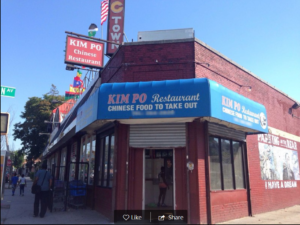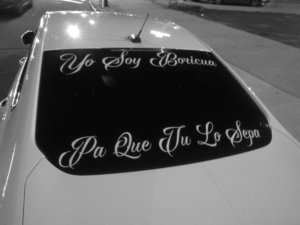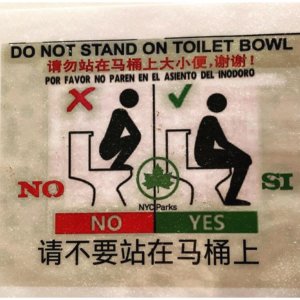Read More]]>
The language/dialect I have chosen to write about is Haitian Creole. This particular kind of Creole is spoken in the beautiful region of Haiti and the Dominican Republic. The entire population of Haiti (7 million people) speak Haitian Creole. There about 10 to 12 million people on earth who speak this language. This language is French-based with influences from Portuguese, Spanish, English, Taino and West African Languages. Haitian Creole was first spoken by African slaves and French settlers during the Atlantic slave trade in the French colony of Saint-Domingue which is now known as Haiti. Today, Haitians are the largest creole-speaking community in the world. It is also spoken in the Bahamas, Canada, Cayman Islands, France, French Guiana, Guadeloupe, Puerto Rico, and the U.S. (Ethnologue).
Because Haitian Creole is a French-based language, over 90% of the Haitian Creole vocabulary is of French origin. They share similar pronunciations and share many lexical items but there are still many differences between the languages. For example, the word for “frequent” in French is fréquent; however, its cognate in Haitian Creole frekan means ‘insolent, rude, and impertinent’ and usually refers to a person. Using certain terms like this can lead to people being misjudged and misunderstood depending on how they interpret the use of the terms.
Both French and Haitian Creole are official spoken languages in Haiti. Like in most civilizations there is a social class in Haiti. French is mostly spoken by the people in the higher class of the society and people who speak the language of Haitian Creole are considered to be a part of the lower class.
Based on my own knowledge and experiences, the people of Dominican Republic look down on Haitians for many reasons. Haitians are perceived as immigrants in DR who have “invaded’ many neighborhoods and have taken over many job opportunities in the nation. For these reasons, Dominicans don’t usually tend to get along with Haitians. The way I see it, Haitians are to Dominican Republic just like Mexicans are to the United States of America. Haitians, like Mexicans, traveled to another country seeking great opportunities, employment, hope for their future, to escape poverty in their homeland and basically to help find the resolutions to all of their issues and worries. There are more than 2 million Haitians living in the Dominican Republic as of the year 2010, most of which are undocumented. Some Dominicans have learned to get along and compromise with Haitians with the little Spanish/Haitian Creole they know. They get to work with each other, live next to each other and spend time together -they usually offer Haitians work because Haitians don’t really ask for high wages. It’s sad to say that there are other Dominicans who treat them as if they were inhuman. I believe that shouldn’t be allowed, even if they are considered to be “aliens”, everyone should be treated with the same respect.
No matter where you choose to live, you will be judged and categorized based on how you speak, the words you choose to use, how you use them, the way you look, the color of your skin, your clothes, your accent, your quietness, your loudness, ect.
Works Cited
“Dominican Republic – Spanish Language and Culture.” Learn Spanish Online for Free with VeinteMundos RSS, www.veintemundos.com/en/spanish/dominican-republic/.
“Haitian Creole.” Wikipedia, Wikimedia Foundation, 1 Dec. 2018, en.wikipedia.org/wiki/Haitian_Creole.
“Haitians in the Dominican Republic.” Wikipedia, Wikimedia Foundation, 16 Nov. 2018, en.wikipedia.org/wiki/Haitians_in_the_Dominican_Republic.
Questions:
- Should I add more examples?
- Anything I can add on/improve/remove?
Read More]]>
To understand Patois, it is important to know a bit of its history and how it came to be the dominant language spoken in modern Jamaica. During the time of slavery between the eighteenth and nineteenth century, slaves were sent to Jamaica to work on sugar plantations. Wanting to lower any possibility of rebellion, slave owners and other colonizers forced the slaves to speak English; hoping that any talk of escape would be caught immediately. The “broken English” over time began to stabilize into what is known as modern Jamaican Patois that is spoken throughout the island, as well as many other places in the world where Jamaicans congregate; one example of this would be Toronto Canada.
Jamaican music has a lot to do with the interest in the language among the masse. Reggae (A genre of music originating from Jamaica in the 60s that utilizes offbeat rhythms and a slow tempo to) music sung by people like Bob Marley and other popular artists brought the dialect into western eyes in countries like America and Canada as well as eastern countries like the UK and even Asian countries. Though people could not understand the lyrics of the songs, they were filled with the soul of the music. As such, despite the difference between dialects; people were able to connect to each other.
One key difference between Patois is in many phrases. A few examples of this is as follows: “Don’t go there” becomes “Nuh guh deh”. “Come here” becomes “Come yah”. “You’re a liar” becomes “You is a liad” or “You a liad”, and “Why are you lying” becomes “Wha mek you so lie”. Even short insults extend in length with “You’re an idiot” becoming “You mussi born back a cow”. Simple words, like phrases, are also different in Jamaica with examples such as “Smelly” becoming “frowsy”. Stores being called shops, Americans being called Yankees, and any overseas country is called “Foreign”. Other examples would be children being called “Pitneys”, Boys being referred to as “Byai” and girls as “Gyal”.
Though Reggae and such brought a positive interest to Patois, it still did not and does not stop people from regarding Patois as a “Ghetto” dialect. What I mean by this is that some people will hear Patois and assume that the person speaking it is uneducated or poor. This is likely due to the fact that Patois, again, can be rather difficult to understand. Another reason is that Patois is also heard in entertainment through mediums like rap music or characters in television shows who are usually stereotypical.
To conclude, Patois; like every other dialect, has its own history as well as its stereotypes. Though different attitudes exist about Patois, the only way to properly formulate your own opinion would be to go out and converse with a native speaker. You’ll find that despite speaking the same language, you’ll find yourself learning a whole new dictionary of words and phrases. There even exists wall scrolls that teach you how to speak Patois and what different Patois phrases translate to in Standard English.
1. Did I give enough information regarding the history of Patois
2. What can I do to further explain the differences between Patois and Standard English?
3. Are there too many Standard English to Patois Phrases and words? Should I add more or take some out?
]]>
Read More]]>

This is the banner of my local Chinese food store at Farmers Boulevard in Saint Albans Queens. The the sign is mostly in English, the name of the store is Chinese (though the words uses the Latin alphabet rather than Chinese characters).
The sign is simple with it’s purpose, letting anyone who passes by know the name of their restaurant as well as it’s purpose.
]]>
A) This picture was taken in Woodside. Specifically, on Northern Blvd and 51st St. I see this car here all the time, as I bike past this cross street daily. I went to Bryant High School, which is about four blocks from where this picture was taken, and there are a multitude of Hispanics, specifically Puerto Ricans that live in the area.
B) the language used is Spanish. There is no English definition on the sign itself. This is because the message is meant to convey that the owner of this car is prideful in their Hispanic heritage.
C) The message reads
“I am Puerto Rican
Just so you know”

a) where was the picture taken?
-Public Restroom in Pier 17, Seaport
b) what language(s) are used?
-English, Chinese and Spanish
c) what do the signs say?
– The sign is asking civilians to not stand on the toilet seats when using the restroom and demonstrates the proper way to sit on the toilet.
]]>Read More]]>
My dialect of English includes quite a few flaws I wasn’t made aware of until recently. For example, just last week, I was telling a coworker (he is not originially from New York) a story and I said “So I was standing on line…” My coworker immediately mocked me “on line?” he asked. I was shocked. I asked him if “in line” was correct and he said according to the conventions of standard spoken English, “in line” is more commonly used, and therefore regarded as correct. I couldn’t believe I had been saying this simple phrase wrong my entire life. Furthermore, people often associate a heavy accent with “New Yorker” English. I see this as negative, as I do not possess this accent, yet many people that I meet criticize me as being a liar when I tell them I’m from New York City. It usually leads to an argument on whether or not you must have a regional accent- and I say no. For this reason, I believe there general public views my language and dialect as stigmatized.
There are quite a few factors that go into people’s determination of how they percieve a particular dialect. For example, I personally percieve people from mid-west U.S. and more Southern States as less intelligent in general. This is nearly solely due to the “Southern accent” that a lot of regions in the U.S. contain. I feel that when it comes to the perception of Northeastern American English, people stigmatize it. This is due to social status mainly, but partially racially as well. Socially, people generally see New Yorkers as lower-class and less intelligent. Racially, many white Southern-State Americans are aware that there are a plethora of immigrants in New York City especially, and this view our dialect as highly broken English.
]]>Read More]]>
Professor Garcia
ELL 101
Reflective Essay #1
October 1, 2018
I consider myself as a Dominican American. I was born in New York, NY but I was mostly raised in the Dominican Republic. My first language was spanish. I picked up some english phrases from my older siblings before attending school. I was always made fun of the way I pronounced certain english words in my early years, but in my opinion I think I definitely perfected the English language by the time I finished junior high school.
Ever since I learned how to speak english, I would try and engage my parent to learn english as well. My dad got the hang of it pretty well, he is fluent in english and can even write some things depending the subject. My mom on the other hand is still struggling to speak english. She doesn’t feel as comfortable speaking the different language and feels as if people will probably make fun of her and ignore her. Instead of trying to teach her the basics I thought it would be easier if I were to just speak to her in english, since she understands some things and she’d try to respond in spanish, now we use this method of communication every day. Although both my parents understand the english language enough to carry small conversations, I feel more comfortable talking to them in spanish majority of the time.
Growing up, I was raised in a hispanic community in Williamsburg, Brooklyn and also was raised in the Dominican Republic. One of the great advantages of being a bilingual child was that I was able to make a friend or two everywhere I went. I was able to pick up on conversations with kids that spoke english or spanish. In school there were only a few selected students who were also bilingual, those were the students I clicked with the most and I still associate with them ‘til this day.
Questions
- Do my personal experiences help support the main idea of my essay enough?
- Should I use literal examples of what the Dominican Spanish language consists of?
]]>
Read More]]>
Growing in an English and Spanish home brought up who and when and how should we speak both languages. My father always said that in school I’ll eventually learn my English so why not learn Spanish at home and what he said was what concluded. Being Hispanic in our society means that we have to know how to speak Spanish and there’s a correct way when speaking it as well. Language and how we use it shapes us and based on the people that we are around affects it. When in a professional environment we are opt to use our “professional” English and of course when we are at home, with our friends our language becomes more comfortable to us. By this I mean we speak in our languages and the we say things the way we want to; slang.
The reality is people judge you and hire you based a lot on how you speak. The minute people open their mouths we already pick and choose where this person is from and how they were raised. We judge people on the use of their grammar and how they use it. Our attitudes about language affects the way we treat speakers. Dialect is determined by many factors including socioeconomic status and education. We may say that we dont judge people but in reality in a way we do, we read and see if the person is talking to us in slang so we can use that same tone with them. We judge on grammar, we judge on the English they use and we judge on the way they present themselves when speaking. We tend to say that people who only speak in slang were raised in a household where English and maybe even education wasn’t strongly implied. All around us even important speakers we tend to judge and see if they really use those vocabulary words to make them seem smarter.
1. Did I answer the question correctly?
2. Is there anything that I should add or remove ?
3. What else can I use as a guide to answer the question ?
]]>Read More]]>
When other people speak different languages it doesn’t mean that it can be low or high status. Many people that speak different languages can speak in proper ways or professional ways. It doesn’t matter what language you speak you can still speak in a good manner. Everyone in the world either its high status or low status speaks in a professional ways, when you’re in a good mood and in a professional environment you will speak in a ways that should be spoken. My mom for example is not rich or high status, but she knows how to speak when she is around her colleagues or in a professional environment. I believe that all people can speak in a respectful and right way, without profanity or slang.
When you’re with your friends do you ever start to speak and use slang? Well for many people this is always happening no matter what language you speak. Whenever I speak to my friends or my family I tend to use slang and not in a way that is meant to be spoken to when I am at school or at work. I feel that this is always happening whether you’re high status or low status and whatever language you speak. No matter what person it is they will use slang or might say words that are made up. Language should not be the way you see or view a certain person, that person might not be in a certain situation that makes them look like a good person its just where they might be comfortable. You should never judge a book by its cover, sometimes I think that just because a person is speaking Spanish or Jamaican or Chinese that they act or might seem like a bad person. This should not be the case, if you get to know them they will show you who they really are. I’ve had this situation happen to be many times where I would judge someone based on how they talk or what language they speak, and many many times I have been wrong about them. I have met many great people that speak different languages, at my job there are many people that speak different languages and they are very nice people that speak just like everyone else and know how to speak when spoken to.
Do you really think that language can shape your view about people? Language should not be something you judge someone on. It doesn’t matter who it is, getting to know someone is the key to understanding them, showing who they really are deep down and their identity.
Questions:
1.How can I further explain?
2.Is my explanation clear?
3.Do I go off track in the paper?
]]>